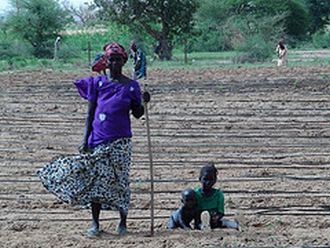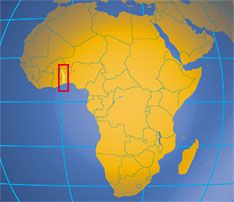
Publisher:
Bonnie King
CONTACT:
Newsroom@Salem-news.com
Advertising:
Adsales@Salem-news.com

~Truth~
~Justice~
~Peace~
TJP
Aug-06-2010 21:20

 TweetFollow @OregonNews
TweetFollow @OregonNews
Land Grabs
Danielle Nierenberg for Salem-News.comAccording to a local farmer’s movement, this purchase will displace an estimated 25,000 villagers in a single province.
 There has been a documented trend in recent years of foreign governments and private firms investing and acquiring large tracts of land in other countries for the purpose of agricultural production and export. (Photo credit: Bernard Pollack) |
(LOME, Togo) - Over the last few years, China, India, and the Middle East have invested heavily in African land, spurred on by the global food and economic crises—as well as the threats of climate change, population growth, and water scarcity. By controlling agricultural land in Kenya, Ethiopia, and elsewhere on the continent, these nations hope to secure future food supplies for their populations, even as sub-Saharan Africa faces increasing hunger.
At least 23 million people are currently at risk for starvation in the Horn of Africa. And this increasing foreign investment in African land has largely remained under the global radar. In addition, the push for alternative energy sources is driving investors to purchase land for energy crops, like corn and sugar cane, which can be used to produce biofuels instead of food.
Some experts argue that “land grabbing” or the investment in foreign soil is progress for agriculture, by bringing development and big agriculture to impoverished countries through the introduction of new technologies and jobs.

But, as the article, The Great Land Grab, co-authored by Nourishing the Planet Advisory Group member Anuradha Mittal, explains, “corporate agribusiness has been known to establish itself in developing countries with the effect of either driving independent farmers off their land or metabolizing farm operation so that farmers become a class of workers within the plantation.”
Land grabs can come at a great cost to local farmers and communities. In Pakistan, for example, the United Arab Emirates purchased 324,000 hectares of land in the Punjab province.
According to a local farmer’s movement, this purchase will displace an estimated 25,000 villagers in the province, where 94 percent of the people are subsistence farmers only utilizing about 2 hectares of land each. Because of these “land grabs,” not only are farmers removed from land, but the local economy also suffers. Many hunger-stricken countries, such as Sudan and Kenya, will have to import foods that were once grown locally.
To read more about land acquisition see: Innovations in Access to Land: Land Grab or Agricultural Investment? and Is There a “Win-Win” Solution to Land Acquisitions?
Danielle Nierenberg is the Co-Project Director for Nourishing the Planet
www.nourishingtheplanet.org
Twitter: @worldwatchag
NtP on Facebook
Articles for August 5, 2010 | Articles for August 6, 2010 | Articles for August 7, 2010





Quick Links
DINING
Willamette UniversityGoudy Commons Cafe
Dine on the Queen
Willamette Queen Sternwheeler
MUST SEE SALEM
Oregon Capitol ToursCapitol History Gateway
Willamette River Ride
Willamette Queen Sternwheeler
Historic Home Tours:
Deepwood Museum
The Bush House
Gaiety Hollow Garden
AUCTIONS - APPRAISALS
Auction Masters & AppraisalsCONSTRUCTION SERVICES
Roofing and ContractingSheridan, Ore.
ONLINE SHOPPING
Special Occasion DressesAdvertise with Salem-News
Contact:AdSales@Salem-News.com
Terms of Service | Privacy Policy
All comments and messages are approved by people and self promotional links or unacceptable comments are denied.
[Return to Top]
©2026 Salem-News.com. All opinions expressed in this article are those of the author and do not necessarily reflect those of Salem-News.com.